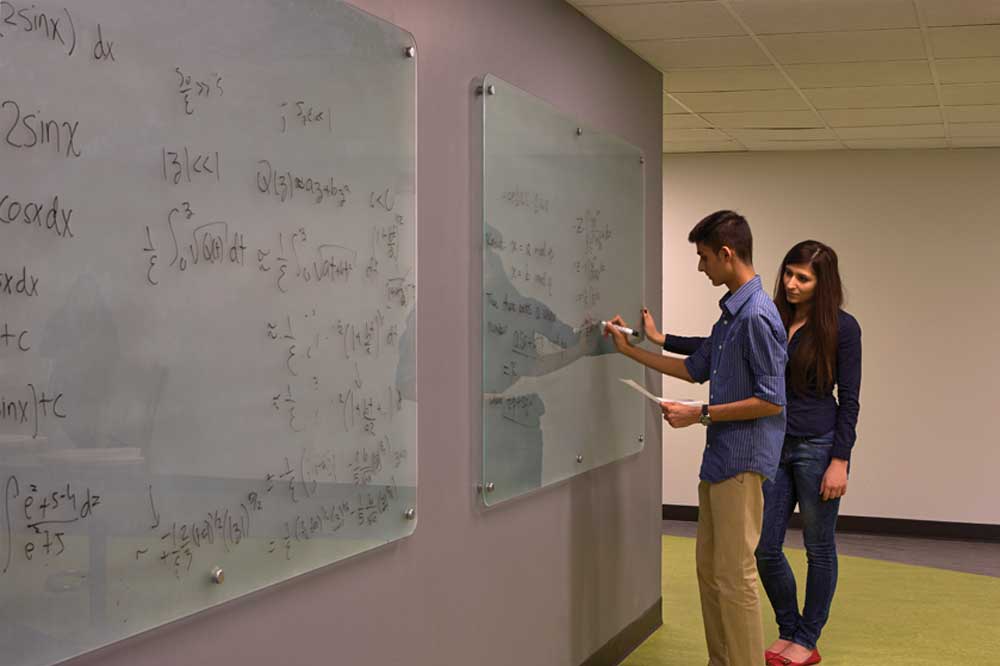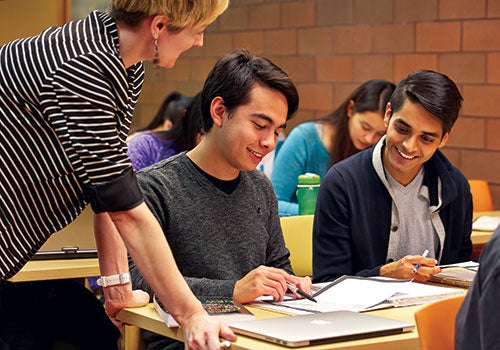
Quick links:
- Research
- Academic Programming
- Global prominence and Internationalization
- Robust Employer-Employee Relationship
Strategic Initiatives: Research
- 2015 QS rankings, published by UK firm Quacquarelli Symonds (QS), put Waterloo 20th in the world for its work in Mathematics and 24th for Computer Science — second amongst Canadian universities in both subjects. Waterloo was ranked 24th in the world in both Mathematics and Computer Science in 2014.
- The Natural Sciences and Engineering Research Council of Canada (NSERC) selected researchers from the Faculty of Mathematics to receive a funding boost to further their transformational and potentially groundbreaking research. 2015 Discovery Accelerator Supplement grants were awarded to:
- Professor Therese Biedl (Cheriton School of Computer Science): producing graph drawing algorithms with performance guarantees that are provable within a factor of the optimum;
- Professor Lap Chi Lau (Cheriton School of Computer Science): creating linear algebraic techniques to design better approximation algorithms and faster exact algorithms for graph problems;
- Professor Rahim Moosa (Pure Mathematics): furthering the role that model theory plays in recognizing, formalizing, and facilitating analogies between different geometric contexts; and
- Professor Sander Rhebergen (Applied Mathematics): developing new algorithms to stimulate fluid flow more efficiently and accurately.
- Professors Dan Vogel, Ed Lank and Michael Terry (Cheriton School of Computer Science), with colleagues from Fine Arts — Stratford, secured a major prestigious Canadian Foundation for Innovation (CFI) grant to create a facility for fully interactive physio-digital spaces. This globally unique facility will provide infrastructure for ground-breaking human-computer interaction and new media art research.
- Professor Edith Law (Cheriton School of Computer Science) was awarded a grant through the CIHR-NSERC Collaborative Health Research Project (CHRP) program. Her research in human-computer interaction will be applied to create a framework for hybrid machine and human computation for the analysis of clinical EEG recordings. This work will significantly impact those who suffer from epilepsy, sleep disorders and other neurological diseases.
- The Ontario government’s 2015 Early Researcher Award (ERA), recognizing talented, recently appointed researchers, went to these members of the Faculty of Mathematics:
- Professor Eric Katz (Combinatorics and Optimization), Tropical Geometry: Structure and Degeneration;
- Professor Robert Koenig (Applied Mathematics), Robust Quantum Computation from Many-body Physics; and
- Professor Laura Sanita (Combinatorics and Optimization), New Algorithmic Approaches for Network Design Problems.
- An NSERC Strategic Project Grant was awarded to Professor Ian Goldberg (Cheriton School of Computer Science) in support of his research project ‘Rigorous Privacy-Enabled Interactions with Online Information.’ Professor Goldberg also received NSERC funding to partner with industry on strategic research. His project ‘Constructing Scalable and Dependable Privacy- Enhancing Technologies’ is in partnership with Sandvine Inc.
- Professor Michele Mosca (Combinatorics and Optimization) and colleagues from the Institute for Quantum Computing hosted the second Quantum-Safe Cryptography Workshop in Ottawa, in partnership with the European Telecommunications Standards Institute. The workshop brings together leading experts in cybersecurity, quantum computing and quantum technologies, along with government and industry leaders to develop a roadmap to ensure tomorrow’s cybersecurity protocols are secure in a world with quantum computers. A white paper, co-authored by Mosca on Quantum Safe Cryptography, was released at the workshop.
- The Mathematical Medicine and Biology research group in the Department of Applied Mathematics, led by Professors Sivabal Sivaloganathan and Mohammad Kohandel, is exploring mathematical modeling of cancer treatments and the sequencing of surgery and chemotherapy.
- The Information Systems and Science for Energy research group, co-directed by Professor Srinivasan Keshav, seeks to increase the efficiency and reduce the carbon footprint of energy systems.
- Mathematics faculty members received external recognition for their contributions to research:
- Professor Raouf Boutaba (Cheriton School of Computer Science), was inducted as a Fellow of the Canadian Academy of Engineering in recognition of his distinguished achievements and career-long service to the profession;
- Professor Ihab Ilyas (Cheriton School of Computer Science) was named an Association for Computing Machinery Distinguished Scientist;
- Professor Tamer Özsu (Cheriton School of Computer Science) and colleagues had a paper recognized with the ACM SIGMOD Test of Time Award as having the most impact over the last decade;
- Professors Yulia Gel, Grace Li, Stefan Steiner and Changbao Wu (Statistics and Actuarial Science) were named Fellows of the American Statistical Association;
- Professor Henry Wolkowicz (Combinatorics & Optimization) was selected as a Society for Industrial and Applied Mathematics Fellow; and
- Professor Eduardo Martin-Martinez (Applied Mathematics) won the Polanyi Prize in Physics.
Strategic Initiatives: Academic Programming
- Beginning in Fall 2015, undergraduate students entering the Faculty of Mathematics will take their Math 135 (Algebra) course in smaller sections. Classes of 180 students have been reduced to 60 to improve the faculty-student ratio and help students succeed in this core first-year course.
- Over two thousand first-year students took the Math communication skills initiative courses in 2014/15. These six courses are designed to build English reading, writing, speaking and listening skills for both native and non-native speakers. The small size of first-year sections (around 25 students) provides the Math students a unique opportunity to socialize with their peers and build strong communication skills early in their university experience. Partners involved in the project — the Department of English, Department of Drama and Speech Communication, Renison University College and St. Jerome's University — report that the program has enjoyed early success.
- The Centre for Education in Mathematics and Computing (CEMC), in partnership with Maplesoft, launched free online courseware in support of secondary school pre-calculus and calculus courses in December 2014. Designed to help both teachers and students, in June 2015 alone this resource has 65,000 page views from nearly 6,000 users all over the world. The CEMC courseware is linked to the Math Readiness Assessment for students coming into the Faculty.
- The Faculty of Mathematics successfully pilot-tested new marking software called “Crowdmark” with 15,000 students in 2014. Use of this technology improves students’ academic experience by providing them feedback more quickly and efficiently.
- (CEMC) won the 2014 NSERC Award for Science Promotion. The award recognizes CEMC success in fueling the interest and developing the abilities of youth in mathematics and computing since 1963.
- Among its many programs and activities, the CEMC had 225K students from more than 60 countries register for its 2014/2015 contests, reaches 600K people per week through its Problem of the Week, and spoke directly to more than 22K students while visiting more than 350 schools in Canada and internationally.

Strategic Initiatives: Global prominence and Internationalization
- Twenty-nine first-year Math students, together with professors Conrad Hewitt and Francine Vinette, spent a term in Rome and France learning both Math and French, in partnership with the University of Montpellier.
- Members of the Department of Statistics and Actuarial Science and the Centre for Education in Mathematics and Computing have partnered with the federal government and Manulife to launch the Risk Management, Economic Sustainability and Actuarial Science Development in Indonesia (READI) project. This initiative aims to increase the number and quality of Indonesian actuarial science graduates to address the country’s growing demand for actuaries.
Strategic Initiatives: Robust Employer-Employee Relationship
- Along with the Faculty of Applied Health Sciences, the Faculty of Mathematics is piloting the Excellence Canada Bronze certification process. Excellence Canada developed and maintains the Excellence Innovation and Wellness Standard for organizational performance, based upon the most effective practices and proven management strategies from around the world.